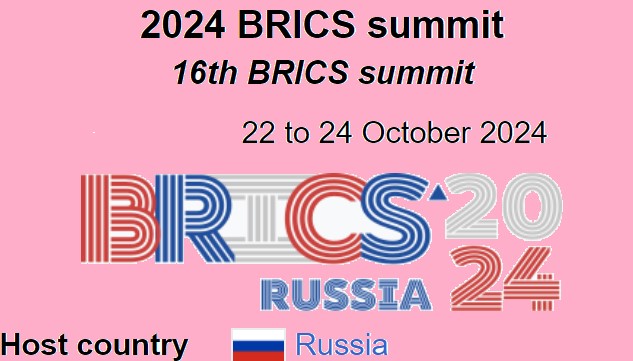
(Photo : wikimedia.org)
The 16th annual 2024 BRICS summit will take place in Kazan, Russia from 22 to 24 October 2024.
- Russian President Vladimir Putin hosts the BRICS summit amid the ongoing war in Ukraine, showcasing the rising influence of non-Western economies.
- The BRICS group, representing 45% of the world's population and 35% of its economy, is a significant global force, with China contributing over half of the group's economic power.
- Amid global unrest, Putin faces questions about a potential ceasefire in Ukraine, insisting on Russia's long-term security interests being considered in any agreement.
- The outcomes of the BRICS summit and the upcoming U.S. presidential election could significantly influence the future course of global politics.
As the world watches with bated breath, Russian President Vladimir Putin hosts the BRICS summit, a gathering of the world's emerging economies, under the looming shadow of the ongoing war in Ukraine. The summit, held in Russia, is a testament to the rising influence of the non-Western world, a fact Putin is keen to showcase. However, the war in Ukraine casts a long shadow over the proceedings, with BRICS partners urging Putin to find a peaceful resolution.
The BRICS group, comprising Brazil, Russia, India, China, and South Africa, represents a significant portion of the global population and economy. Accounting for 45% of the world's population and 35% of its economy based on purchasing power parity, the group's influence is undeniable. China, in particular, contributes over half of the group's economic might, highlighting the shifting dynamics of global power.
Despite the West's portrayal of Putin as a war criminal, the Russian leader maintains that the BRICS group does not position itself in opposition to anyone. Instead, he emphasizes that the shift in global growth drivers is a fact, not a political stance.
BRICS Summit Amid Global Unrest
The BRICS summit coincides with a time of global unrest, with conflicts in the Middle East and Ukraine, a slowing Chinese economy, and concerns over the potential impact of the U.S. presidential election on global trade. Amid these challenges, Putin, who ordered troops into Ukraine in 2022 after eight years of fighting in eastern Ukraine, faces questions about the prospects for a ceasefire in Ukraine.
Putin's stance on the Ukraine issue is clear: Moscow will not trade away the four regions of eastern Ukraine that it claims are now part of Russia. He insists on having Russia's long-term security interests considered in any ceasefire agreement, referring to the Istanbul draft agreements from April 2022 as a basis for talks.
While there is increasing talk in Moscow of a possible ceasefire agreement, nothing concrete has emerged yet. The world is awaiting the result of the U.S. presidential election on November 5, which could potentially influence the situation.
The Future of BRICS and Global Power Dynamics
Russia currently controls about one-fifth of Ukraine, including Crimea, which it seized and unilaterally annexed in 2014, about 80% of the Donbas region, and over 70% of the Zaporizhzhia and Kherson regions. Putin asserts that the West has now realized that Russia will be victorious, but he remains open to talks based on draft ceasefire agreements reached in Istanbul in April 2022.
On the eve of the BRICS summit, Putin held informal talks with United Arab Emirates President Sheikh Mohammed bin Zayed Al Nahyan at his Novo-Ogaryovo residence outside Moscow. The meeting, which lasted until midnight, underscored the UAE's readiness to make any efforts to resolve crises and promote peace, a sentiment Sheikh Mohammed expressed to Putin.
The BRICS summit will see the attendance of Chinese President Xi Jinping and Indian Prime Minister Narendra Modi. However, Brazilian President Luiz Inacio Lula da Silva had to cancel his trip following medical advice to avoid long-haul flights after a head injury at home that caused a minor brain hemorrhage.
* This is a contributed article and this content does not necessarily represent the views of btin.co.in









